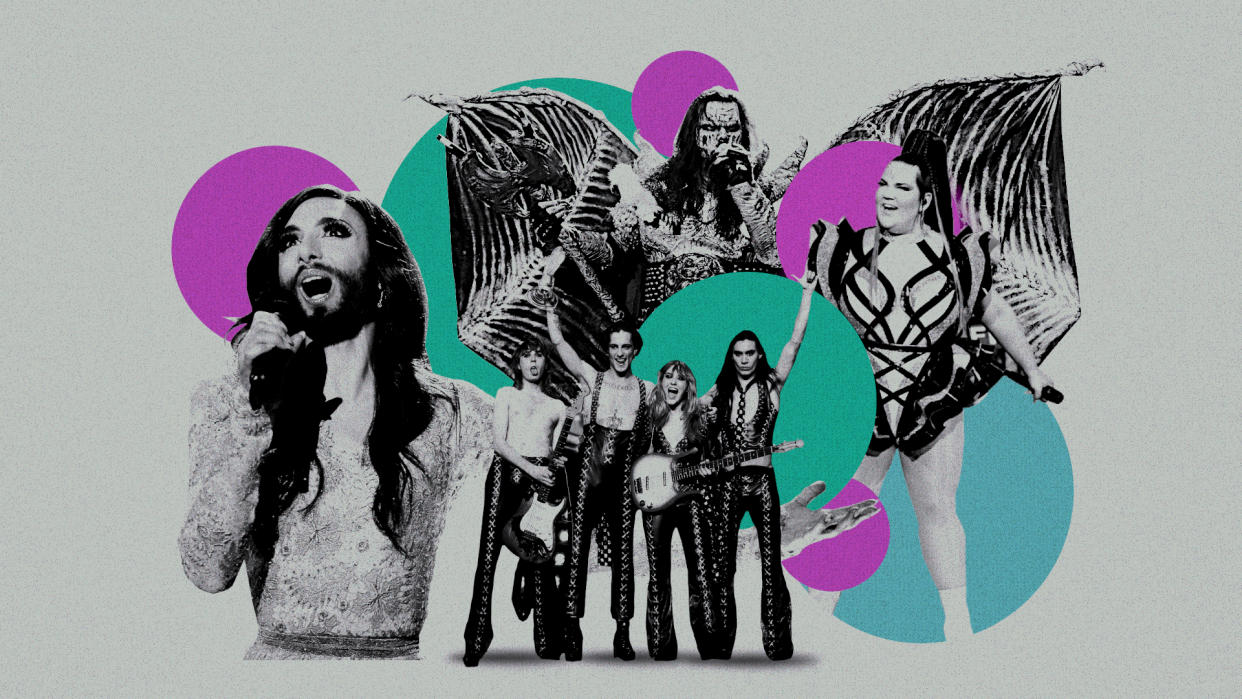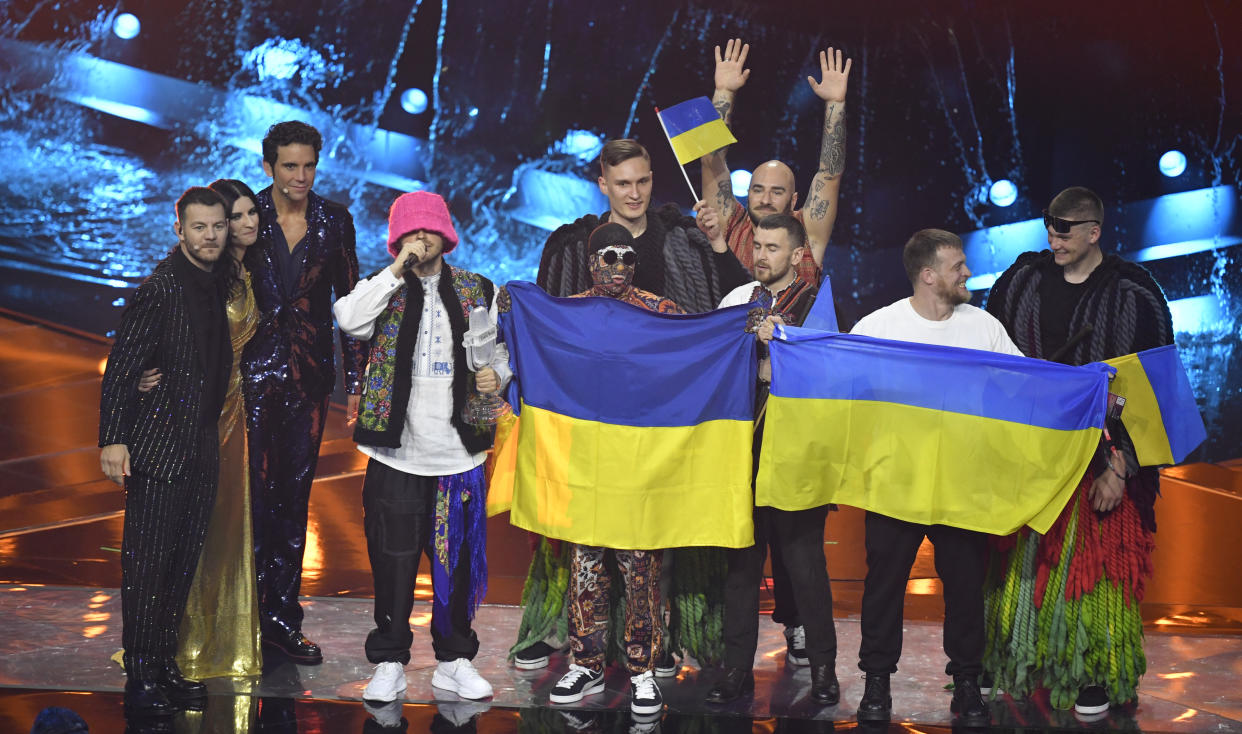The fiery saga of the Eurovision Song Contest, explained

Long before American Idol, The X Factor, America’s Got Talent, or The Voice — before Star Search, even — there was the Eurovision Song Contest. The United Nations of all talent competitions, with participants representing as many as 52 countries from all across Europe, the U.K., and Australia, Eurovision is one of the most-watched and longest-running TV broadcasts on the planet, with an average annual audience of 200 million. However, Eurovision awareness has only recently hit a high in the United States, for a variety of synergistic reasons, so ahead of this weekend’s 67th Eurovision Grand Final, which will take place May 13 at England’s Liverpool Arena, here’s a primer on all things EVSC for newly initiated Stateside viewers.
The Eurovision Song Contest was developed by the European Broadcasting Union way back in 1956, when the television industry itself was in its infancy, as a live broadcasting experiment and a way to produce cheap programming. Since then, the production budget has certainly multiplied by millions of Euros, but the show itself has in many ways remained charmingly untouched by time, with international contenders all decked out in spandex and sequins while executing variety-show choreography that wouldn't have been out of place during ABBA’s famously, fabulously career-launching Eurovision 1974 performance of “Waterloo.” It is perhaps the only televised talent competition more over-the-top than The Masked Singer or RuPaul’s Drag Race; an actual drag queen, Austria’s “Bearded Lady” Conchita Wurst, in fact won Eurovision in 2014.
Other recent Eurovision standouts, none of which anyone at the EBU could have possibly envisioned back in ’56, have included Israel’s 2018 winner, Netta, who used a looper to create trippy, beatboxed EDM performances and told Yahoo Entertainment that EVSC was “the weirdest, cheesiest, corniest, most amazing, colorful, sensitive, exciting ride that I had in my entire life”; Finland’s GWAR-like monster rockers Lordi; Iceland’s leather-masked BDSM provocateurs Hatari; and the “Twin Terrors of Dublin,” identical X Factor twins Jedward, who competed twice. Justin Hawkins from the Darkness was once a semifinalist for the United Kingdom, even. (He was robbed.) Flo Rida randomly showed up to assist San Marino’s pop duo Senhit in 2021, prompting confused BBC commentator Graham Norton to blurt, “That is Flo Rida, the multibillion-selling rapper. … I don’t know why he’s here.” John Lydon, of Sex Pistols/PiL infamy, surprisingly gave it a go this year, representing Ireland, but he too was robbed.
Up until 2016, American viewers weren’t actually able to watch Eurovision without some sort of geo-unblocked VPN hack, but then Logo finally picked it up; for the third year in a row, the contest can now be watched in the U.S. via streaming service Peacock. Of course, the Eurovision Song Contest would have made for ideal escapist entertainment in 2020, but like many other events that were canceled that year due to coronavirus concerns, EVSC 2020 was called off for the first time in the competition’s long history. Ironically, however, 2020 was the year that Eurovision-mania started to escalate in the States, thanks to Will Ferrell’s 20-years-in-the-making satire Eurovision Song Contest: The Story of FireSaga. That movie’s cast, accompanied by the real-life Eurovision alumni (like Wurst and Netta) who appeared in the film’s delightful “Song-a-Long” medley, had actually planned to descend upon the real-life EVSC finals in the Netherlands that year. But even without that genius, totally meta promotional stunt, the film became a Netflix hit and eventually nabbed an underdog Best Song Oscar nomination for “Húsavík (My Hometown).” And it introduced many Stateside music fans, even Fire Saga director David Dobkin himself, to the wacky, wonderful world of Eurovision.
While Ferrell had been a longtime Eurovision obsessive, in 2020 Dobkin admitted to Yahoo Entertainment that until he was brought on to the Fire Saga project, he’d been entirely unfamiliar with the EVSC phenomenon. “I love music. I'm a big music video fan and a music video director, and so music's always been a really big part [of my career]. But I’d never heard of the contest,” said the director, whose credits include videos for 2Pac, Blues Traveler, Coolio, Elton John, and Maroon 5. “It's so weird that when I actually was sent the script, I was like, ‘There's no way I'm doing a singing-contest movie.’ I passed on it! But my agent called me back and said, ‘You know, Will's in it, and he really wants you to read it.’ I read the script, and it was so charming and I fell in love with these characters. So, I called back and said, ‘It's really funny. But we have to change the title. It's a terrible title — Eurovision!’ And my agent was like, ‘You know this is a real thing, right?’
“I hung up the phone and I Googled it,” Dobkin continued with a chuckle. “And I spent the next four hours going through just the last decade of finalists, thinking, ‘This is insane!’ It's way bigger than the Super Bowl. I mean, it's World Cup-sized. For something like that to exist that I had never heard of was shocking to me. It was like the dark web opening up. As I got deeper into it, it seemed weirder and weirder and better and better to me. And by the way — there's nothing in the script that really prepares you for how weird the real thing is.”
The real Eurovision triumphantly returned in 2021, and things got even weirder. Not only did Hannes Óli Ágústsson, the actor who played the Húsavík mayor in Fire Saga, appear in character on the live 2021 broadcast — to repeatedly demand that the show “play ‘Jaja Ding Dong’!” — but that year’s winner, Italy’s “Zitti E Buoni” rabblerousers Måneskin, went viral after frontman Damiano David appeared to snort cocaine while sitting in the Eurovision contestants’ lounge. (David later voluntarily took a “f***ing drug test,” which came back negative, but he told Yahoo Entertainment that he regretted refuting the rock ‘n’ roll rumor, saying, “I wanted people to think, ‘Maybe he's so f***ing crazy that he did it!’”) Måneskin — the first rock act to win EVSC since costumed metal slayers Lordi in 2006 — went on to have the second-biggest TikTok song of 2021 and a surprise top 15 U.S hit with their raucous cover of the Four Seasons’ “Beggin’,” and they established themselves the one of the biggest emerging rock bands of the past decade, touring with the Rolling Stones, recording with Iggy Pop and Tom Morello, earning raves from Metallica and the Red Hot Chili Peppers, performing on Saturday Night Live, and even earning a Grammy nomination for Best New Artist.
Of course, most celebrated and beloved Eurovision winner of all time — even more so than Celine Dion, who won in 1988 representing Switzerland with “Ne Partez Pas Sans Moi” — is Sweden’s ABBA. That’s the reason why Eurovision Song Contest: The Story of FireSaga cold-opened with a scene of Ferrell’s Lars Erickssong as a young boy, transfixed by the Swedish glam-pop sensations’ satin-pantalooned EVSC performance of “Waterloo.” ABBA’s 1974 breakthrough even managed to beat Olivia Newton-John’s “Long Live Love” at Eurovision that year, and it set the standard for all glittering Eurovision spectacles to follow; a half-century later, it remains the competition’s most iconic moment. In fact, when Agnetha, Björn, Benny, and Anni-Frid recently reunited after a four-decade hiatus with their virtual ABBA Voyage concert residency in London, it wasn’t any of the high-tech performances by that revue's Industrial Light and Magic-masterminded ABBA holograms (or “ABBAtars”) that elicited the most thunderous applause; instead, it was the vintage, two-dimensional intermission footage from Eurovision ’74 that garnered a screaming, standing ovation, night after night.
Eurovision made news again last year for more serious reasons, when the European Broadcasting Union barred Russia from competing following the country’s invasion of Ukraine; in an emotional development, Ukrainian electro-folk rap collective Kalush Orchestra then ended up winning Eurovision 2022 with “Stefania.” While the Eurovision Song Contest usually takes place in the country of the previous year’s champion, this year it was determined that Ukraine was unable to meet the demands of hosting such a large-scale event due to security concerns caused by Russia’s invasion, so EVSC 2023 is taking place in the United Kingdom, the home of 2022 runner-up Sam Ryder. The BBC recently paid lovely tribute to Ukraine as Liverpool officially took over hosting duties this year.

As a side note, TikTok star Ryder’s curse-breaking second-place finish last year with "Space Man" was historic in its own right, because British entries tend to fare poorly at Eurovision. In fact, in 2021, the U.K. placed dead last on the leaderboard, with zero points. However, some fans believed that Britain might’ve had a better shot of winning that year if a grassroots campaign — to have the United Kingdolls from RuPaul’s Drag Race U.K. compete with their “RuRuvision Song Contest” surprise chart hit “UK Hun?” — had been taken seriously.
Eurovision 2023 festivities are already well underway in Liverpool, with that Merseyside city’s reunited fab five, ‘80s LGBTQ+ pioneers Frankie Goes to Hollywood, kicking off the week-long spectacle with their first performance in 36 years, fittingly of the party-starter “Welcome to the Pleasuredome.” With NBC’s recent attempt to recreate EVSC’s campy magic on this side of the pond, with the doomed “American Song Contest,” sadly proving unsuccessful (despite being co-hosted by Snoop Dogg and featuring Michael Bolton and SisQó respectively representing Connecticut and Maryland), all American eyes will be back on Peacock this weekend, to watch the original competition that started it all 67 years ago.
Artists representing 26 out of 37 total participating countries will compete in Saturday’s final, after qualifying in two semifinals rounds that took place earlier this week and were determined solely by public televoting. The results of the Grand Final will be determined by a combination of national juries and viewer voting, as has been the tradition since 2009, and another Swedish EVSC sensation, Loreen, who won Eurovision in 2012, is the odds-on favorite to prevail again this year with her hypnotic pop power ballad, “Tattoo.” Sweden is followed by Finland, sentimental favorite Ukraine, Spain, and France on sports betting sites, but interestingly, there doesn’t seem to be much of a home-court advantage for the United Kingdom this year, as British entry Mae Muller’s “I Wrote a Song” is ranked a relatively distant ninth by bookies, with 66/1 odds.
All 37 of this year’s Eurovision Song Content entries can be heard here, but we’re rooting for the Hi-NRG, high-BPM rage of Finnish rapper Käärijä’s “Cha Cha Cha,” the Muse/Placebo-reminiscent, existential dream-state dread of Serbian synthpopper Luke Black’s “Samo Mi Se Spava”... and especially piss-taking, Mercury-mustachioed Croatian punks Let 3’s totally bonkers “Mama ŠČ!” and German industrial metal-smelters Lord of the Lost’s brilliantly titled “Blood & Glitter” (imagine if Lordi and Måneskin had a Rosemary’s baby), both of which embody everything fun and freaky about Eurovision.
Watch all of those pre-final performances below as a cram-study crash course for this weekend, and get ready for Saturday's big show, which will also feature triumphant return performances by six EVSC alumni, including Netta and Iceland's robbed real-life hero Daði Freyr, who was widely predicted to be 2020’s winner with “Think About Things” before that year’s contest was lamentably canceled. Even without (presumably) a command performance of “Jaja Ding Dong” by fictional Icelandic act Fire Saga, as you can see, this weekend’s spectacle is sure to be pure fire.
Read more from Yahoo Entertainment:
Follow Lyndsey on Facebook, Twitter, Instagram, Amazon

